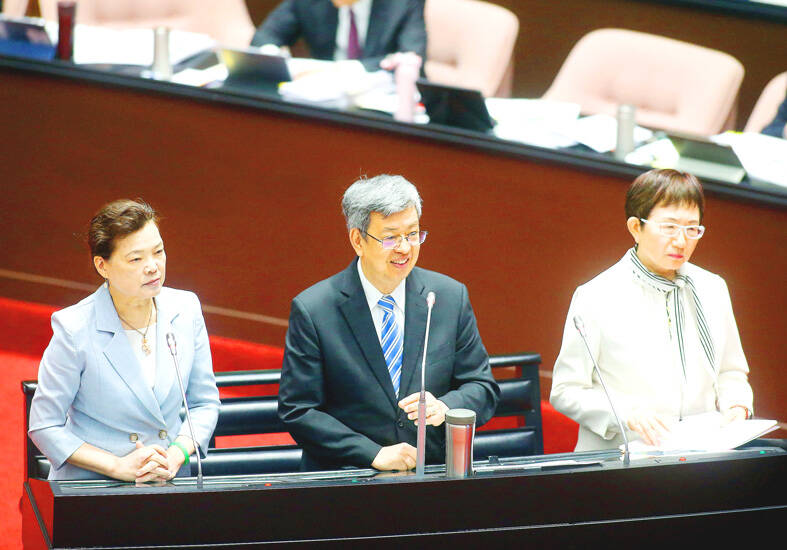The US Senate on Tuesday unanimously passed legislation affirming its support for the initial trade agreement reached under the US-Taiwan Initiative on 21st-Century Trade.
The bill, which cleared the US House of Representatives on June 21, was passed in the Senate by a voice vote, and is to be sent to US President Joe Biden to be signed into law within 10 days.
Taiwan and the US signed a first agreement under their “21st century” trade initiative on June 1, which covered customs and border procedures, regulatory practices and small business in a bid to make trade and investment between the two sides easier.

Photo: CNA
Following the signing, the two sides said they planned to begin negotiations on other, more complicated issues, such as agriculture, digital trade, labor, environmental and nonmarket policies and practices, and state-owned enterprises and standards.
In addition to granting approval for the initial agreement, the bill would ensure that Taiwan-US trade negotiations are subject to strict requirements on public transparency and congressional consultation, the US Senate Committee on Finance said in statement.
In Taipei, Premier Chen Chien-jen (陳建仁) yesterday called on the Legislative Yuan to approve the first-stage agreement during its extra legislative session, which started on Monday and runs through July 31.
Speaking to reporters, Chen dismissed criticism from opposition lawmakers that because the initial agreement does not include tariff relief, it would provide few tangible benefits to Taiwanese companies.
The deal’s trade facilitation measures — which standardize and streamline the import and export process — would ensure substantial benefits and savings, while providing a legal foundation for further expanding bilateral trade ties, he said.
Minister of Finance Chuang Tsui-yun (莊翠雲) told lawmakers that her ministry estimated that Taiwan’s customs declaration and courier companies would be able to save NT$100 million (US$3.22 million) in costs a year thanks to the deal’s trade facilitation measures.
The Presidential Office yesterday thanked the US Senate for passing the trade bill, saying the move indicated concrete action in support of trade relations between the two sides.
Presidential Office spokeswoman Lin Yu-chan (林聿禪) told reporters in Taipei that the passage of the bill by the US Senate and House was smooth and fast, demonstrating bipartisan support in the US for bolstering economic and trade relations with Taiwan.
The trade initiative is an important milestone in deepening US-Taiwan trade relations, the Ministry of Foreign Affairs said in a statement.
The foreign ministry said it would continue to work closely with the Executive Yuan’s Office of Trade Negotiations, US administrative departments and the US Congress to improve economic and trade relations between Taiwan and the US.

INVESTIGATION: The case is the latest instance of a DPP figure being implicated in an espionage network accused of allegedly leaking information to Chinese intelligence Democratic Progressive Party (DPP) member Ho Jen-chieh (何仁傑) was detained and held incommunicado yesterday on suspicion of spying for China during his tenure as assistant to then-minister of foreign affairs Joseph Wu (吳釗燮). The Taipei District Prosecutors’ Office said Ho was implicated during its investigation into alleged spying activities by former Presidential Office consultant Wu Shang-yu (吳尚雨). Prosecutors said there is reason to believe Ho breached the National Security Act (國家安全法) by leaking classified Ministry of Foreign Affairs information to Chinese intelligence. Following interrogation, prosecutors petitioned the Taipei District Court to detain Ho, citing concerns over potential collusion or tampering of evidence. The

Seventy percent of middle and elementary schools now conduct English classes entirely in English, the Ministry of Education said, as it encourages schools nationwide to adopt this practice Minister of Education (MOE) Cheng Ying-yao (鄭英耀) is scheduled to present a report on the government’s bilingual education policy to the Legislative Yuan’s Education and Culture Committee today. The report would outline strategies aimed at expanding access to education, reducing regional disparities and improving talent cultivation. Implementation of bilingual education policies has varied across local governments, occasionally drawing public criticism. For example, some schools have required teachers of non-English subjects to pass English proficiency

‘FORM OF PROTEST’: The German Institute Taipei said it was ‘shocked’ to see Nazi symbolism used in connection with political aims as it condemned the incident Sung Chien-liang (宋建樑), who led efforts to recall Democratic Progressive Party (DPP) Legislator Lee Kun-cheng (李坤城), was released on bail of NT$80,000 yesterday amid an outcry over a Nazi armband he wore to questioning the night before. Sung arrived at the New Taipei City District Prosecutors’ Office for questioning in a recall petition forgery case on Tuesday night wearing a red armband bearing a swastika, carrying a copy of Adolf Hitler’s Mein Kampf and giving a Nazi salute. Sung left the building at 1:15am without the armband and apparently covering the book with a coat. This is a serious international scandal and Chinese

NEGOTIATIONS: The US response to the countermeasures and plans Taiwan presented has been positive, including boosting procurement and investment, the president said Taiwan is included in the first group for trade negotiations with the US, President William Lai (賴清德) said yesterday, as he seeks to shield Taiwanese exporters from a 32 percent tariff. In Washington, US Trade Representative Jamieson Greer said in an interview on Fox News on Thursday that he would speak to his Taiwanese and Israeli counterparts yesterday about tariffs after holding a long discussion with the Vietnamese earlier. US President Donald Trump on Wednesday postponed punishing levies on multiple trade partners, including Taiwan, for three months after trillions of US dollars were wiped off global markets. He has maintained a 10 percent